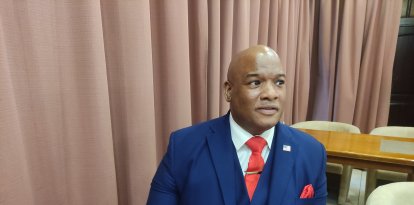Luxury beliefs: beliefs or ideas that we can't afford
Rob Henderson writes about 'dissolving' ideas that, when put into practice, ruin lives and entire societies. The same is true in JD Vance's 'Hillbilly, a rural elegy': both show what real life is like.

JD Vance and Rob Henderson
Less than a year ago, while browsing what is now X, I came across Rob Henderson. Someone mentioned him, and I started reading about him and his concept of luxury beliefs, or, also, luxury ideas. Both terms, whether beliefs or ideas, I think, in any case, come to the point.
Beliefs, in as much as in the end it is a faith in something we do not see, a trusting of very alien third parties, be they supposed experts, ideologues, elites, governments, etc. to rely on something vital that contradicts one's own experience or the accumulated experience of those who preceded us (the latter is called tradition and it is most useful, it is knowledge decanted and tested empirically).
Ideas, as regards theories, mental, ideological frameworks, which do not resist, precisely, the encounter with reality.
So both beliefs and ideas are valid interpretations of the concept.
'Troubled': I've been there, what are you telling me
Last February Henderson published Troubled: A Memoir of Foster care, Family and Social Class, an account of his childhood and youth. It is a text that, through the biographical information in it, explains, to a large extent, that concept he coins. The book is moving in what it tells and how it tells it. However, it does not appeal to compassion (even if you feel it), but, above all, to common sense.
Very briefly, here is the story: Henderson did not get to know his father, his mother was a drug addict and he spent his early years from foster home to foster home to finally be adopted by a couple that ends up divorcing while he was still small. The adoptive father soon disappears from the scene, the mother begins a relationship with a woman whom he lives with for a few years, there are various economic problems and, soon, that couple also finally breaks up.
"For some time now, certain ideas have been exhibited, as mink coats were once exhibited, and these come to be socially imposed with lethal effects."
Henderson thus has a hard, solitary and almost uncared for and unheeded childhood. "Learning" that adults come and go and that, above all, they make their life, even if they then tell you whatever about love, that of course they love you, that their breakup has nothing to do with you, etc., etc., etc. And in that environment he does what he can: flirting with drugs, bordering on petty crime, alcoholism, and not very recommendable company.
However, by a stroke of luck, he ends up in the Army and, after his time in it, he finally manages to face some of his addiction problems and go to what is supposed to be an excellent university, Yale.
There, at that fine university, he encounters some surprises.
Defending (openly) political correctness
Because it is there, at Yale, where he discovers how there are elites - his classmates are all rich and from good families, with few exceptions - who publicly defend a series of beliefs and ideas on vital issues that touch all of us closely: the education of children, the role of effort and demand, family life, and so on.
Those ideas, those theories, contradict everything Henderson has personally experienced, and also, oh surprise, what his own peers (with stable families, educated in good schools) have actually experienced and experience.
"If you are poor you can't afford not to believe in effort, you can't afford not to have a family, you can't afford not to fight to have one, and you can't afford not to fight for it afterwards."
So it's not just that Henderson knows firsthand that living with a father and mother is a distinct advantage and that it shocks him that there is someone who advocates that "any model is good," it's that his peers have benefited from stable families, to give one example. Although there is much more to that concept of luxury ideas that can be applied today to many other issues.
What is happening? Well, it happens that, revisiting Veblen and that of the idle class, for some time now certain ideas have been exhibited as a mink coat or the long nails of a mandarin (which meant that he does not work with his hands precisely). Ideas that come to be imposed socially with lethal effects. Ideas that the elites spread as sign of prestige, as virtue signaling as well, always so much to the liking of progressivism and with the invaluable help of the media, universities, high economic instances, etc.
Social engineering, experts and the woke...
These beliefs or luxury ideas can then be put in relation with that careful work of social engineering that has been developing in the West.
The movement started partly in Sweden, but California has also done a lot for it, as have the Pelmas of '68. Even those beliefs are ultimately linked to the woke, which is nothing but the death rattles of all the above.
They tell you that it doesn't matter how we grow up, that sex is a token, they sell you nihilism in vein, the disaster of climate change that we can avoid if we don't eat meat and don't move and a thousand other pammems. They tell you that you will have nothing and you will be happy, for example, that not having a house doesn't matter, that you are a citizen of the world, and so on.
But how do those who preach this live? And how do those who believe it or we believe it live? How do we end up living? You only have to look around to see what is happening.
Ideas that harm, most importantly, the weakest
Because all of the above has to do with what Henderson explains.
Actually the author does not reveal anything new with his luxury beliefs, he simply puts an accurate term to it: beliefs (ideas, theories) that are a luxury, that you cannot afford in general, even less if you are poor or have some kind of weakness, because then the consequences are brutal, as our Western societies show.
"In his book 'Hillbilly, a rural elegy,' JD Vance shows what real life is like."
Learning is not the same as not learning at school, but if you're poor you're destined to be a slave. Being a woman and being able to lead a life inside is not the same as not leading one when it comes to guiding your life and what you want to do with it or on a specific night. If you're poor you can't afford not to believe in striving, you can't afford not to have a family, you can't afford not to fight to have one and you can't afford not to fight for it later.
The list of things that we cannot afford and that our ancestors perhaps knew through vague science, and without experts, can be continued.
As opposed to the common man or your own grandmother (without a master's degree and without television)...
Because, in addition, we can look at all those luxury ideas or beliefs right in front of their opposite: that common sense of the past. That is, Chesterton's common man for whom home and family were his kingdom or, without going any further, the ideas that our own grandmothers may have had, who, without formal education or titles - without television, too - recognized the importance of life and had a healthy distrust of any charlatan who tried to sell them hair growth products. And today, let's face it, we're being sold hair loss treatments everywhere and we buy them without problems.
These luxury ideas are thus treated precisely as theories, eccentric theories that pass over the experiential basis of humanity or even over experience itself. They are nothing else, despite the damage done personally and socially by them.
Who are you going to believe, your own eyes, or what the elites sell you? That could be the summary of the term coined by Henderson. And, according to several recent events, it seems that a certain rebellion against some of these luxury ideas and the creepy salesmen is beginning to be perceived.
And I was reminded of all this precisely with the news that Vance, another who knows reality up close, has been chosen by Trump as his second. Saving distances and differences, also in his Hillbilly Elegy (Hillbilly, a rural elegy) Vance shows what real life is like.
Both books can give us clues about what's moving.... And why it's moving.
This article was first published in masterennubes.blogspot.
RECOMMENDATION






















